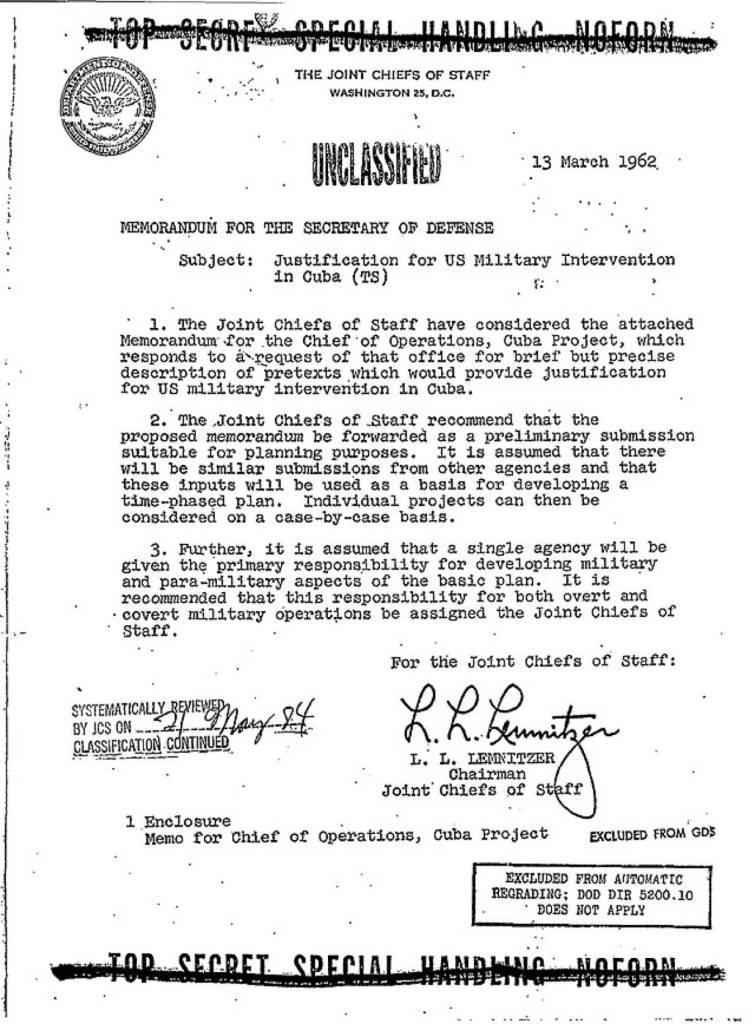A recently resurfaced declassified CIA document has reignited public debate and historical scrutiny over “Operation Northwoods,” a controversial Cold War-era plan proposed by the United States military in the early 1960s. The document, which has gained traction on social media platforms like Reddit, outlines a series of proposed false flag operations intended to manufacture public support for military intervention against Cuba under Fidel Castro’s leadership.

What Was Operation Northwoods?
Operation Northwoods was a covert strategy designed to create a pretext for a U.S. invasion of Cuba by orchestrating acts of terrorism and attributing them to the Cuban government. The plan, developed in response to Cold War tensions and the perceived threat of communist expansion in the Western Hemisphere, proposed several alarming tactics, including:
• Terror Campaigns: The military suggested staging a “Communist Cuban terror campaign” in American cities such as Miami and Washington, D.C. Proposed actions included the bombing of public places, the assassination of Cuban émigrés, and even the sinking of boats carrying Cuban refugees to create widespread fear and outrage.
• Military Incidents: One of the most audacious proposals involved detonating a U.S. Navy ship at Guantanamo Bay, leading to American military casualties. This staged attack would have been blamed on Cuban forces, prompting public outrage and justifying military retaliation.
• Hijacking and Air Disasters: Another proposed scenario included faking the hijacking of American commercial aircraft, with CIA operatives posing as passengers. In a more extreme version, the plan suggested staging the destruction of an airliner to simulate a Cuban attack and provoke international condemnation.
Who Approved the Plan?
In March 1962, the Joint Chiefs of Staff, under the leadership of General Lyman Lemnitzer, approved Operation Northwoods and presented it to the Kennedy administration. The plan underscored the lengths to which military strategists were willing to go to achieve their objectives in the Cold War climate.
Why Was Operation Northwoods Proposed?
The plan emerged in the aftermath of the failed 1961 Bay of Pigs invasion, an unsuccessful CIA-backed operation to overthrow Castro’s regime. The U.S. government, increasingly alarmed by Cuba’s close alliance with the Soviet Union and the potential spread of communism in the region, sought aggressive measures to counter the perceived threat. Operation Northwoods was conceived within this context of heightened geopolitical anxiety and a desire to justify direct military action.
What Happened to the Plan?
Despite strong support from military officials, President John F. Kennedy ultimately rejected Operation Northwoods, reportedly expressing deep concern over the ethical and strategic implications of such deceptive tactics. His decision not only prevented the plan’s implementation but also contributed to growing tensions between the White House and military leadership, with some suggesting it played a role in later conflicts within his administration.
Public Disclosure and Reaction
Operation Northwoods remained classified for decades until it was finally declassified in the late 1990s by the John F. Kennedy Assassination Records Review Board. Initially, the document did not attract significant public attention; however, its recent resurfacing on social media platforms has fueled renewed interest and concern. Many view the plan as a troubling reminder of the extreme measures considered during the Cold War and question whether similar tactics have been employed in other geopolitical conflicts.
The public reaction to the revelations has been mixed, with some expressing shock and outrage over the government’s willingness to contemplate such deceptive acts, while others argue that desperate times called for extreme measures in the fight against communism.
Current Implications and Ongoing Debate
The renewed discussion around Operation Northwoods has raised broader questions about government transparency, military ethics, and the role of covert operations in shaping public perception. As the U.S. government continues to declassify historical records, including those related to the JFK assassination under former President Donald Trump’s administration, interest in Cold War-era intelligence operations remains high.
Military analysts and policymakers stress the importance of maintaining robust oversight and accountability mechanisms to ensure that national security strategies align with ethical standards and democratic principles. The legacy of Operation Northwoods serves as a stark reminder of the potential consequences of unchecked military power and the need for vigilance in preventing similar abuses in the future.
As discussions about government accountability and national security policies continue, Operation Northwoods stands as a cautionary tale about the complexities and moral dilemmas inherent in geopolitical conflicts.





